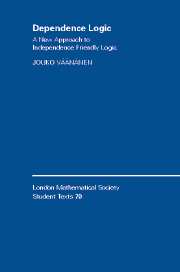5 - Game theoretic semantics
Published online by Cambridge University Press: 15 December 2009
Summary
We begin with a review of the well known game theoretic semantics of first order logic (see, e.g., ref. [17]). This is the topic of Section 5.1. There are two ways of extending the first order game to dependence logic. The first, presented in Section 5.2, corresponds to the transition in semantics from assignments to teams. The second game theoretic semantics for dependence logic is closer to the original semantics of independence friendly logic presented in refs. [16] and [19]. In the second game theoretic formulation, the dependence relation =(x0, …, xn) does not come up as an atomic formula but as the possibility to incorporate imperfect information into the game. A player who aims at securing =(x0, …, xn) when the game ends has to be able to choose a value for xn only on the basis of what the values of x0, …, xn–1 are. In this sense the player's information set is restricted to x0, …, xn–1 when he or she chooses xn.
Semantic game of first order logic
The game theoretic semantics of first order logic has a long history. The basic idea is that if a sentence is true, its truth, asserted by us, can be defended against a doubter. A doubter can question the truth of a conjunction s ∧ ψ by doubting the truth of, say, ψ. He can doubt the truth of a disjunction s ∧ ψ by asking which of s and ψ is the one that is true.
Information
- Type
- Chapter
- Information
- Dependence LogicA New Approach to Independence Friendly Logic, pp. 63 - 85Publisher: Cambridge University PressPrint publication year: 2007
